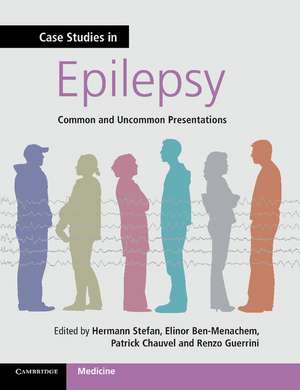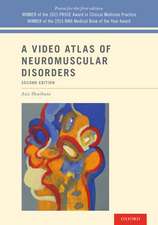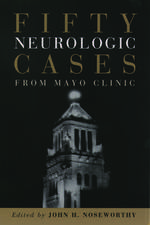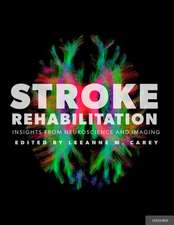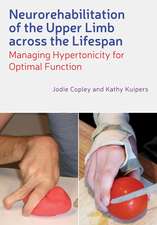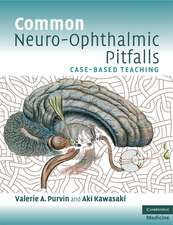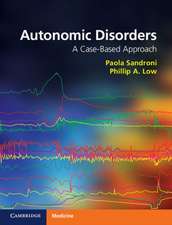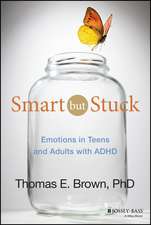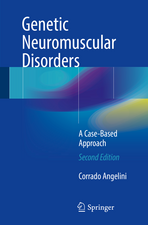Case Studies in Epilepsy: Common and Uncommon Presentations: Case Studies in Neurology
Editat de Hermann Stefan, Elinor Ben-Menachem, Patrick Chauvel, Renzo Guerrinien Limba Engleză Paperback – 21 noi 2012
Preț: 450.94 lei
Preț vechi: 474.67 lei
-5% Nou
Puncte Express: 676
Preț estimativ în valută:
86.30€ • 89.76$ • 71.24£
86.30€ • 89.76$ • 71.24£
Carte tipărită la comandă
Livrare economică 14-28 aprilie
Preluare comenzi: 021 569.72.76
Specificații
ISBN-13: 9780521167123
ISBN-10: 0521167124
Pagini: 214
Ilustrații: 118 b/w illus. 16 colour illus.
Dimensiuni: 189 x 246 x 11 mm
Greutate: 0.42 kg
Ediția:New.
Editura: Cambridge University Press
Colecția Cambridge University Press
Seria Case Studies in Neurology
Locul publicării:Cambridge, United Kingdom
ISBN-10: 0521167124
Pagini: 214
Ilustrații: 118 b/w illus. 16 colour illus.
Dimensiuni: 189 x 246 x 11 mm
Greutate: 0.42 kg
Ediția:New.
Editura: Cambridge University Press
Colecția Cambridge University Press
Seria Case Studies in Neurology
Locul publicării:Cambridge, United Kingdom
Cuprins
Preface; Part I. Diagnosis: 1. First seizure: is it epilepsy?; 2. Intractable epilepsy and epilepsia partialis continua associated with respiratory chain deficiency; 3. Reasons for violent behaviour - when a man strangles his wife; 4. Repetitive monocular eye adduction; 5. Febrile infectious-related epilepsy syndrome (FIRES); 6. Epileptic seizures as presenting symptom of the Shaken Baby Syndrome; 7. Benign rolandic epilepsy; 8. New onset focal and generalized epilepsy in an elderly patient; 9. When laughing makes the child fall down; 10. Epileptic spasms and abnormal neuronal migration; 11. A feeling of gooseflesh; 12. Generalized epilepsy in adolescence as initial manifestation of Lafora disease; 13. Epilepsy with a right temporal hyperintense lesion in MRI; 14. Epileptic falling seizures associated with seizure-induced cardiac asystole in drug-resistant temporal lobe epilepsy; 15. Seizures, dementia and stroke?; 16. Comorbidity in epilepsy - dual pathology resulting in simple focal, complex focal and tonic clonic seizures; 17. Minor motor events; 18. Epilepsy in the ring chromosome 20; 19. A late diagnosis of medial temporal lobe epilepsy; 20. Experimental phenomena in temporal lobe epilepsy; 21. The use of depth EEG (SEEG) recordings in a case of frontal lobe epilepsy; 22. A frontal lobe epilepsy surgery based on totally non-invasive investigations; 23. A young man with reading-induced seizure; 24. The lady from 'no-man's-land'; 25. The man who came (too) late; 26. Paraneoplastic limbic encephalitis; 27. Really a cerebrovascular story?; 28. Sudden unexpected death in epilepsy - the ultimate failure; 29. Blind but able to see; 30. Seizure disorder! Really unexpected?; 31. Transient epileptic amnesia in late onset epilepsy; 32. A really unexpected injury?; 33. Epileptic negative myoclonus in benign rolandic epilepsy; 34. Sporadic hemiplegic migraine; 35. A strange symptom: psychotic or ictal?; 36. Hearing voices: focal epilepsy guides diagnosis of genetic disease; 37. Life threatening status epilepticus due to focal cortical dysplasia; 38. Childhood occipital idiopathic epilepsy; Part II. Treatment: 39. Unconscious: never again work above a meter?; 40. A patient's patience; 41. Idiopathic absence epilepsy: unusual AED consumption successful; 42. Woman with gastric reflux - careful with combinations of medications; 43. An example of both pharmacodynamic and pharmacokinetic interactions; 44. Never give up trying to find the right medication even in patients who are refractory; 45. Juvenile myoclonic epilepsy and seizure aggravation; 46. Episodic aphasia - surgery or not?; 47. Temporal lobe epilepsy: drugs or surgery?; 48. Shaking in elderly: reversible or fate?; 49. Failure of surgical treatment in a typical medial temporal lobe epilepsy; 50. Cutaneous adverse reactions by AEDs: chance or predetermination?; 51. Timing of medical and surgical treatment of epilepsy: a hemispherotomy that would have prevented disabling cerebellar atrophy; 52. Anticonvulsive drugs for gate disturbance and slurred speech?; 53. Unsuccessful surgery: another chance?; 54. If it's not broken, don't fix it!; 55. Never ever give up; 56. Hippocampal deep brain stimulation may be an alternative for resective surgery in medically refractory temporal lobe epilepsy; 57. Myoclonic seizures and recurrent nonconvulsive status epilepticus in Dravet syndrome; 58. Functional hemispherotomy for drug-resistant post-traumatic epilepsy; 59. Pharmo-resistent epilepsy?; 60. Vagus nerve stimulation for epilepsy; 61. The strange behaviour of a vegetarian: a diagnostic indicator for treatment?; Index.
Recenzii
'… the book is very entertaining … some particular clinical 'pearls' are scattered among the patients' histories, enriching the value of this work.' European Neurology
Descriere
This selection of epilepsy case studies will inform and challenge clinicians at all stages in their careers.
